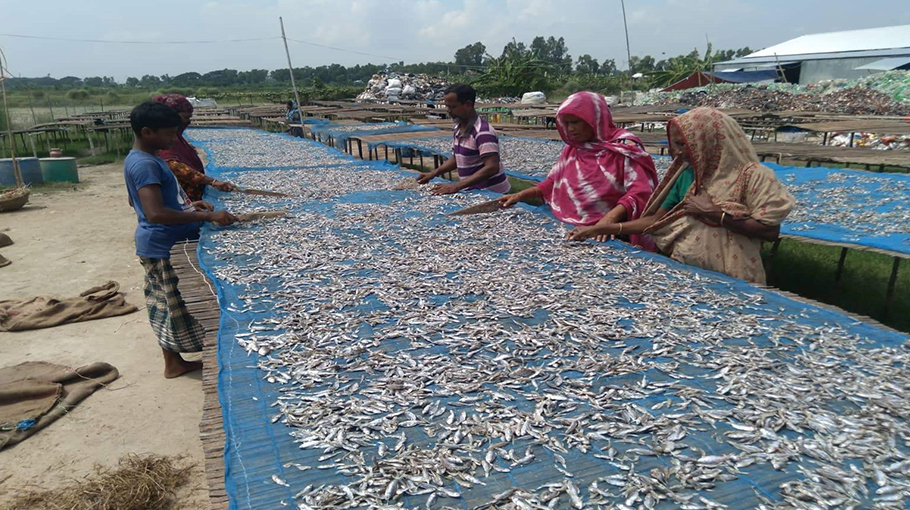Processing plants in Chalan Beel area in trouble for fall in fish production

The shortage of raw fish has become acute this year in the dry fish factories of different areas of Chalan Beel. A handful of two or four people have started their business but most of the dry fish traders have not yet started their business. Due to the high price of raw fish, most of those who have started the business are facing losses.
Every year usually after monsoon, fish drying is started in this area on a limited scale. As the water recedes, the sale of fish increases.
This year, the bills have almost dried up at the beginning of autumn. Although the water in the bill has decreased, not much fish is being caught in the nets of the fishermen in the Chalan Beel area. Some dryers have started drying fish on a limited scale, but many have not yet set up drying factories. There are no fish in Beel water.
In other years, fish drying usually goes on in full swing at this time, but this time the stock of fish is low, which is the fear of fishermen and dried fish traders. This picture is said to have spoken to the dry goods traders of Mahishluti area of Tarash upazila of Chalan Beel.
Even though the dry season has started, the dry workers of Chalan Beel area are not busy. During other years, hundreds of men and women dry cleaners of Chalan Beel area were busy buying, washing, drying and sorting fish from morning till night. This time the picture is different. Apart from Mohisaluti, fish drying take place in various areas including Atrai, Chatmohar, Bhangura, Gurdaspur, Singra, Halti, Lahiri Mohanpur of Chalan Beel, but fish shortage is going on almost everywhere.
It has been found out that in Chalan Beel area, there are 48 Beels, 14 canals and 11 rivers in which large and small fish species were found in abundance. Fishermen used to catch fish with the help of different types of fishing equipment. Dried fish was sent to different markets of the country including Sayedpur, Nilphamari in the northern region. In the evolution of time, many species of fish are now on the way to extinction. Although the species and amount of fish has decreased, in recent years, about a hundred dry traders and thousands of dry workers in this area were making a living by drying fish. But due to the fish crisis, dry fish traders are worried whether they will be able to start business this time or not. But hopefully, the extent and production of pond fish farming has been increasing in recent years.
Nannu Hossain of Gurdaspur Upazila Shapgari village has been doing dried fish business in Chalan Beel area for almost twenty years. He said, other years our business starts at full speed at this time. This year, we have only started the work of setting up the dried fish factory. It is certain that the fish will be less this year, but it is not yet possible to say how much less it will be. If the fish is less, the price is higher. He also said that there is a huge demand for fish in Chalan Beel area in India.
We spend a lot of money to send fish to the markets of Nilphamari, Syedpur, Rangpur. A limited amount of salt is provided in fish preservation facilities. The dried fish business depends on luck. Dry fish traders are suffering due to lack of storage facilities for processed dry fish in Chalan Beel area and lack of big dry fish storehouse nearby.
Mofazul Hossain, a dry fish trader of Handyal East Market area, said that native small fishes are currently available. They are buying these fish for 40 to 45 taka per kg. Native dried fish are being sold at Tk 200 to Tk 300 per kg depending on the size at the Sayedpur location. So far he is at a loss. Due to fish crisis, many have not started business yet. Delwar Hossain of Sekendaspur in Ullapara said that there is no fish in the Beel. Most of the fish are taken from the bill with banned nets. As a result, production of chicks has decreased. That is why the fish crisis has become so acute.
In this regard, Chatmohar Upazila Senior Fisheries Officer Sujit Kumar Monshi said that this year, due to low monsoon and rain water, the amount of naturally growing fish in the open reservoir of Bill has decreased. However, the production of farmed fish in the pond is expected to be more than last year.



